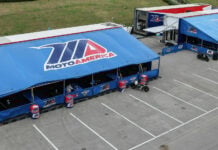The Long And Winding Road”¦ And Sea Lane The new Russian round in the SBK championship presented some unique challenges to overcome in terms of logistics. Despite the distances travelled, the race was not a true ‘fly-away’ event. When the Russian race was announced on the 2012 Superbike World Championship calendar, the immediate question was would it be a ‘long haul’ race (where everything is flown in from the normal European bases of operation) or would it be the biggest road trip ever undertaken, with everything going as usual in the team trucks? The decision, given that the race would be at the all-new Moscow Raceway circuit, around 100km or so west of Moscow city centre, was for a road trip. One which also involved a 28-hour ferry ride to start and finish with. The planning of this vast undertaking started long before the journey did, and most of the costs of ferry travel etc were picked up by the series organisers, Infront Motor Sports. Their logistical partner, SEL, had formulated a plan which saw the team’s truck drivers rendezvous in the German port of Lubeck, take a ferry to the Latvian port of Ventspils, drive to the border with Russia, then take the M9 highway all the way to the new racetrack. For Kawasaki Racing Team truck driver Ignasi Tamburini Rovira (nickname Tambu) and team hospitality truck driver Joan Ferraz Abad (nickname Johnny) it was a new adventure, a challenge of course, but most of all a very long and arduous journey. Tambu takes up the story of how it all unfolded. “After the Silverstone race we went all the way to Germany, to Hanover, where truck parking had been arranged by the IMS agent SEL. When the truck was safely there I took a flight home to Spain. In the morning of 14th August I caught a flight to Hanover again, and on 15th we all started the real journey to Russia. We had to stay in the port of Lubeck for ten hours, waiting for the boat, paperwork, customs, all those things. Then we spent 30 hours on the boat.” The journey was smooth and as his photos show, idyllic in some ways as the sun set into the Baltic Sea, and it was a chance for some much-needed relaxation. It was to get very busy after that. “After arrival in the port of Ventspils in Latvia, we went our own way to the marshalling point 15km from the Latvian/Russian border, about 460kms from the port,” said Tambu. “There was no problem there. We were formed into groups there – five or six trucks in a group – to be escorted through Russia by a security car. My group was at the Karsava border crossing at 4pm and finished there at 2am. Some groups went there at 10pm and waited all night!” He continued, “At the border they looked into all the trucks, checked all the things in the truck, and there were many, many controls. When we finished we went to the parking area 500 meters inside the Russian border then at 10am we started the travelling section from there. It was 12 hours from the border to the track and we had two stops on the way.” Progress was slow in some areas, partly because in places there was no tarmac surface on the road, and partly because the road surfaces left much to be desired anyway especially for a modern truck designed for smooth European highways. “The roads are incredible,” said Tambu. “We made 640km to arrive in 12 hours. At one stage there was no road, just sand, gravel. On the other carriageway there was a road, surface but not our side. Then we got the tarmac strip and the other side was only gravel. Incredible. We had the truck in first gear, doing 5kmph, for about four kilometres on the gravel section. There were many potholes in the road and a big difference in the camber. There were many places where the road was worn out, and the trailer was jumping from side to side sometimes. Sometimes the Russian truck drivers came past us with about 10cm clearance!” The overall journey time from start-to-finish was vast, as Tambu again explained. “In total, starting from home, it was over five days to get there,” he confirmed. “I started in 14th in the morning and arrived 19th in the night.” And of course, getting there is only half the job. “On Thursday 30th August we should get back to Germany, and will take the truck directly to the Nürburgring,” said Tambu. “Then I fly home on Friday night, 31st. I will come back to the track in Germany for Thursday morning 6th September, just before the race weekend, because I am the tyre man also, not just the truck driver.” The first extra-European adventure that did not require a long-haul set-up proved to be a little bit epic, but with Tom Sykes winning the first race in Russia for the Kawasaki Racing Team the rewards for all the effort of Tambu and Johnny getting all the kit there safe and sound were measurable and immediate, not to mention satisfying and joyful. Winning is what all this effort is all about.
© , Roadracing World Publishing, Inc.





